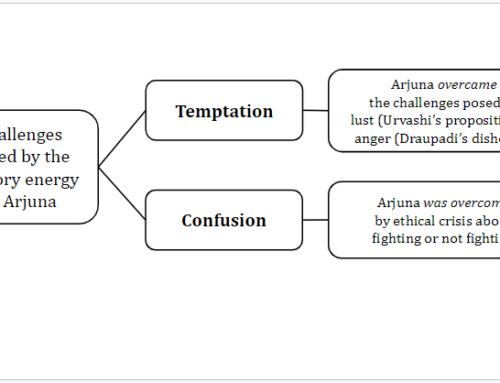People sometimes ask, “When everything comes from God, why can’t we enjoy everything? Why restrict our enjoyment of some things?”
Because though everything comes from God, everything doesn’t take us to God. We need to see not just the commonality of the source of everything, but also the dissimilarity of their effects on our consciousness.
Such an awareness of commonality-cum-dissimilarity is illustrated in the Bhagavad-gita’s usage of the word ‘daivi’ (meaning divine) in two opposing contexts. One usage occurs in the Gita (07.14), wherein the material energy (maya) that illusions us is deemed divine. Another usage occurs in the Gita (09.13), wherein the energy that the devoted take shelter of is deemed divine.
Though both these energies are divine, clearly, they are different – one keeps us away from Krishna, while the other enables us to come closer to him. Why, then, are both called divine? Because they both come from the same source; both are Krishna’s energies.
Still, the Gita (07.14) urges us to transcend the first divine energy – the material energy – by taking shelter of Krishna. The next verse (07.15) deems those who stay within that energy misdirected, even demoniac. The subsequent verses lauds those who strive to go beyond the material energy as pious (07.16) and those who succeed in going beyond it as great souls (mahatmas: 07.19). And the Gita later (09.13) uses that very describer (mahatma) for appreciating those souls who take shelter of Krishna through the other divine energy.
The divinity of both the energies implies that we are always subordinate to God – we can never go outside his jurisdiction. But by focusing on the different effects of the two divine energies, we learn to go from the deluding divine energy to the illuminating divine energy, thereby attaining affinity for the supreme divinity.
To know more about this verse, please click on the image
Explanation of article:

Podcast:



Thank you Prabhu, Very wonderful point “Because though everything comes from God, everything doesn’t take us to God”. Can you pls give some material analogy on this point. Thanks
Explained here:
http://www.thespiritualscientist.com/2016/01/if-everything-comes-from-krishna-why-doesnt-everything-take-us-to-krishna/
ys
ccdas